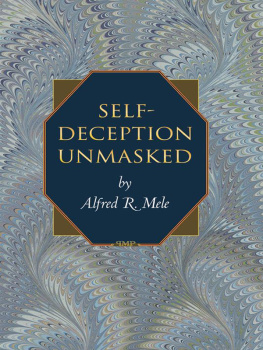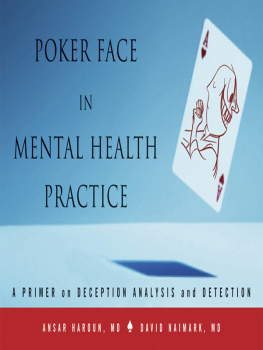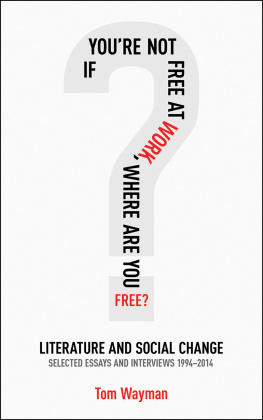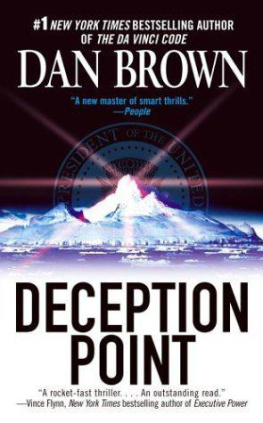Table of Contents

Deception
Walks among Us!
M. C. Wayman
ISBN 978-1-0980-9400-3 (paperback)
ISBN 978-1-0980-9401-0 (digital)
Copyright 2021 by M. C. Wayman
All rights reserved. No part of this publication may be reproduced, distributed, or transmitted in any form or by any means, including photocopying, recording, or other electronic or mechanical methods without the prior written permission of the publisher. For permission requests, solicit the publisher via the address below.
Christian Faith Publishing, Inc.
832 Park Avenue
Meadville, PA 16335
www.christianfaithpublishing.com
Printed in the United States of America
To my wonderful wife, Sandra Elaine Welch Wayman; three beautiful children, Michelle E., Erica L., and Michael C.; three loving grandchildren, Briana, Eric, and Amaya; and my dog, Pepper Rico.
A Job Well Done
Give me my flowers and praises while I am alive
So I may grow wise and thank you accordingly.
Do not wait until the day I die to say A job well done!
Because those words will do me no good, Because I am gone!
When I get to heaven and see all my family and friends,
Then God will say, Well done, well done, my Son !
M. C. Wayman, MA, BS, AA (November 26, 1988), awarded Outstanding Achievement in Poetry
Chapter 1
The Author

M y name is M. C. Wayman. I was born in 1949 in Youngstown, Ohio. My parents migrated to the North in the middle of 1939. My mother was a housewife, and my father worked in the steel industry as a blast furnace worker. I did not realize that my parents had very little education until I entered the elementary schools second grade. My mother and my father could not read or write. They depended and trusted on members of their family, friends, and the landlord who could. At the age of eight, I was writing letters to other relatives, filling out money orders, paying bills, etc. for them. I taught my father, who knew little about first-grade arithmetic, to read on a first-grade level and to print/sign his name. His father believed that a Black man needed only a little education to survive. My mother knew how to add and subtract some small numbers from her mother when buying groceries and items from the general storefrom the symbols and pictures on items which she remembered and how their names were pronounced. But she was not taught how to read or write. Her father believed a womans place was in the fields during harvesttime and at homecooking, raising the children, and doing housework. As I recall, a neighbor did teach her how to write and print her name. Later, my wife taught her to read on a first-grade level while I was overseas in 1971. My parents had good common sense and excellent understanding of what was going on within and around their social surroundings.
I enlisted in the United States Air Force (USAF) in December 1968 and retired from the USAF at the end of March 1989, after having served for twenty years and three months. During my military career, I earned an associates degree in business management technology in 1979, a bachelors degree in management/human resources in 1986, and a masters degree in human resources development/management in 1988.
I served for fifteen years in the United States Air Force as an administrative specialist in the following fields of management: administration, personnel, industrial security, and record management. I honorably retired in 1989. In September 1989, I served as a local veterans employment representative for the Missouri Division of Employment Security (MDOES). The position required me to work closely with many government (federal and state) agencies and community organizations to provide preferential assistance and counseling to numerous qualified veterans interested in finding meaningful employment.
I left MDOES in the middle of 1990 and started working at the National Archives and Records Administration, Civilian Personnel Records (CPR), St. Louis, Missouri, as a management analyst specialist for the assistant director of CPR for ten months until an archives supervisor specialist position became available. I retired from the National Archives and Records Administration, Civilian Personnel Records (CPR), St. Louis, Missouri, as a supervisory archives specialist in 2010.
My wife, Sandra Elaine Welch, and I have been married for over fifty-two years and have three wonderful children (Michelle, Erica, and Michael) and three grandchildren (Briana, Eric, and Amaya).
Chapter 2
The Authors Observations
T he comments on what is going on with Black America in todays society are my personal observations and opinions and what I believe will have a continuous effect on Blacks in the future if the issues pertaining them are not appropriately addressed by those who have the power to make changes. During my years of observations regarding race relations, I felt that the Blacks accomplishments slowed down during the middle of 70s through the late 90s because some Blacks and Whites in Washington, both those who had the power to change laws and those who were not in power, had gotten comfortable with the achievements of 60s and 70s. Even though the marching and protesting of the 60s had made a big impact and things have seemed to move forward, many of us did not fully complete the assignment with the tools that were laid out for us to continue the journey. Plus, we forgot that there were still Blacks and other minority groups struggling.
The Blacks struggles were not over. When people have choices, the right to assemble is recognized as a human rights, and protest is in the First Amendment. Therefore, the individuals religious beliefs and political views of society will have the most impact on changes. To do what an individual feels is right, even though it may be wrong and dangerous to others, is a very hard choice.
While I was growing up as the only child, most of the people whom I came in contact with over the years stated that I never really had it hard because I was raised in the North, my father was a steel-mill worker, and my mother was a stay-at-home mom. Do not forget the color of my skin too. They failed to realize that my father and other Black men did not earn the paycheck amount the White men were paid during that time frame. Also, Black men were the first to be laid off during a reduction of supply and demand for steel. Therefore, Black men had to manage their pay very carefully. Even though my parents could barely read or write, during the early stages of their lives, they were able to adapt and survive with the skills they had learned over the years. I will never forget what my father told me one day while sitting on the back porch. He said, There is no place on Gods green planet where you can live for free, and if so, let me know immediately when you find out. As a teenager, I did not take his words for truth at that time.
At the age of thirteen, I had many odd and part-time jobs to pay for my school clothes and supplies because what my parents thought were in style were not. At a certain time of the year, my father was laid off, and I needed to help. I mowed several lawns around the neighborhood. At the Newport Family Restaurant, I washed dishes and mopped floors. At the age of sixteen, I started making deliveries to customers homes and shops. Also, I drove to Cleveland, Ohio, to pick up supplies and equipment on Saturday mornings. During the summer, I worked full-time as a playground manager in my neighborhood for the city of Youngstowns youth program, which was designed for summer employment for teenagers (aged sixteen to nineteen) from low-income families. Then it hit me what my father had said, Living nowhere for free, because I had to give my mother forty dollars per month (ten dollars per week) for taking care of my belongings, washing my clothes, making my lunch for school/work, and room and board. This was one of the many principles that my parents believed in in terms of learning to become a responsible person.













